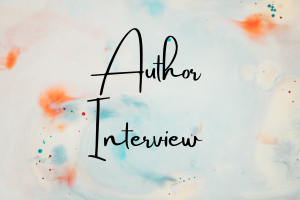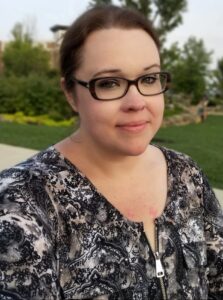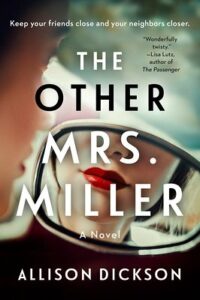Peering Behind That Façade: An Interview with Allison Dickson
 It’s not every day that the people I interview live near me, but today’s guest does. And, I crossed paths with her, in-person, before I knew who she was. If I could only go back in time, I’d deliver a dramatic fangirl moment to Allison Dickson. Allison has been writing for years, and in addition to The Other Mrs. Miller, she has quite the collection of works to her name. And readers love her work. One reviewer wrote, “Domestic suspense, with a big heaping side of F.U.N., for the win!” while another said, “The Other Mrs. Miller is a darkly written adventure into the deep recesses of the mind.” In addition to writing (and everything else), Allision is a podcaster too. Her podcast, Ding Dong Darkness Time “puts her fascination with the weird, morbid, and macabre out on the airwaves.” With so much going on in Allison’s world, I’m grateful she found time to answer my questions!
It’s not every day that the people I interview live near me, but today’s guest does. And, I crossed paths with her, in-person, before I knew who she was. If I could only go back in time, I’d deliver a dramatic fangirl moment to Allison Dickson. Allison has been writing for years, and in addition to The Other Mrs. Miller, she has quite the collection of works to her name. And readers love her work. One reviewer wrote, “Domestic suspense, with a big heaping side of F.U.N., for the win!” while another said, “The Other Mrs. Miller is a darkly written adventure into the deep recesses of the mind.” In addition to writing (and everything else), Allision is a podcaster too. Her podcast, Ding Dong Darkness Time “puts her fascination with the weird, morbid, and macabre out on the airwaves.” With so much going on in Allison’s world, I’m grateful she found time to answer my questions!
Christina: We just passed the anniversary of your novel, The Other Mrs. Miller, which is a domestic thriller. What about the genre calls to you? What inspired the story?
Allison: My love of thrillers probably really started with my early discovery of Alfred Hitchcock movies. The way they were both aesthetically pristine, but with this subversive grit just below the surface. And I have always loved stories about the darker side of marriage and family, and how we always build a façade that’s acceptable to the wider world. I love peering behind that façade. The Other Mrs. Miller was especially an opportunity to explore that, but in a really over-the-top way. What if one of your neighbors suddenly started being impersonated? What if the people who moved in next door to you aren’t everything they’re cracked up to be? There’s suspense built right into that question, and the sky’s the limit in terms of how to answer it.
Christina: You also write horror and dystopian fiction, in addition to other “twisted fiction,” as you say. What similarities do you find in horror, dystopian, and domestic thriller fiction? And what is your definition of twisted?
Allison: I believe domestic thrillers bring the opportunity to examine dystopia on a person/individual scale. Humans are probably the common thread through all of it, because people are equally capable of being either heroes or monsters. I like to think of twisted a couple of ways. First in its ability to be surprising, either through unexpected plot turns or the use of structure to amp up the emotions I’m after. But more than that, I think of it as something that dares to touch on the taboo.
Christina: I love to ask about the writing process because it seems everyone does something different. So what’s yours? Do you ever make tweaks to that process or is it a tried-and-true practice?
Allison: The one thing I must have no matter what is access to all the movie score playlists I’ve made in Spotify. I usually change them up depending on the project, but ambient music is something that really helps me immerse myself in a scene. But describing the rest of my process might also come off a little like a horror movie. When I’ve been fully engaged in a novel, the world more or less ceases to exist. Eighteen hours a day at the keyboard, forgetting to eat and shower, drinking too much caffeine, being incredibly preoccupied. And forget about actual housekeeping. It’s not healthy, and the older I get, the more I’ve had to enforce a better work-life balance. Limiting myself to a normal workday, taking regular breaks. And not just breaks within the day, but taking whole days off if I’m feeling fatigued, or if I feel a carpal tunnel flare creeping up. Being a writer isn’t exactly dangerous, but it’s terrible on the body. Whatever anyone’s individual process is, I hope it includes specific attention to self-care. Once you’re into your forties, you realize things aren’t as elastic as they used to be.
Christina: You once said that “Stephen King is the reason I’m a writer today.” He’s inspired a lot of people, but that’s a strong statement. Can you expand on it?
Allison: I discovered King at a very formative age, around ten or eleven. And though I’d been interested in telling stories even before that, King was the first one who put the bug in me that said, “I want to make other people feel the way this book is making me feel.” It gave me the “why” to the equation of the whole writer thing. I still feel this way when I discover a brilliant piece of story, be it in a book, movie, or even a video game. When I encounter something that truly blows my mind, the first thing I think is “How can I improve my skills so I can deliver this feeling right here?” I owe that to King, and he still ignites that feeling in me with his work.

Christina: Questions about the publishing industry and journey to publication are some of my favorites too. You decided to go the agent and big publisher route. Did you ever consider any other option? Did anything surprise you on the journey? Do you have any tips for anyone just starting out?
Allison: When I completed my very first novel, the first thing I did was try to get an agent. So the first tip I’m going to offer is DON’T DO THAT. I had so much growth to do, but I was just excited. That excitement is important, but channel it into the next book. I promise you, it’ll be a better one. Often a writer’s creations are invisible stepping stones leading toward something else. They aren’t all going to be fit for publication. Arnold Schwarzenegger wasn’t competing for Mr. Universe after his first week of lifting weights. We have to train our writer muscles the same way, and that takes time and patience.
I spent a number of years publishing via small presses and DIY in the beginning, becoming part of writer communities on Facebook, exploring the process, learning the etiquette, studying the publishing industry, and learning how book production works. About six years after I had my first ever short story published in a tiny anthology no one ever heard of, I wrote the book that got me my agent. BUT (and this leads to the final tip), that doesn’t mean you’re going to get a book deal. She wasn’t able to sell the book that got her to offer me representation, but she did sell my next book. That time I spent learning about how things operate and developing my work ethic really came in handy during those times. Oh, and if you do get an agent, look for one who is willing to actually work with you and your manuscript.
Christina: Let’s talk about your podcast! Ding Dong Darkness Time is a podcast “on all things vaguely macabre.” That’s pretty, well, vague! What’s your intent with the podcast? How did it come about? Which topic so far is a favorite? Is there anything you won’t cover?
Allison: Podcasting is just such a beautiful medium for learning and sharing. Podcasts have brought me so much fulfillment as a listener, and similar to my comments on Stephen King above, a great podcast always leaves me wanting to blow someone away with knowledge the way my favorite shows do for me. I also consider myself sort of a Swiffer for random knowledge. I love the study of history, true crime, psychology, cults, and humanity in general, and I love unearthing a story not many have been aware of. So Ding Dong Darkness Time is my audio repository for all those things. And the darkness element is flexible. We talk about serious things, but in a fun and conversational way. I don’t like to say there is anything I won’t cover, but I don’t want to do things that are overly charged. In this Age of Perpetual Outrage we find ourselves in, there are some topics where people are so fully encapsulated in their views, that you might as well put a Kick Me sign on your back and be done with it. So I like to focus on topics that I really feel can broaden people’s overall enlightenment, so that perhaps they might be more open-minded about more challenging topics elsewhere. Also, the music for the show is pretty amazing . . .
Christina: Speaking of podcasting, do you think you’ll write a book about a podcaster?
Allison: I actually would be open to that! I’ve tossed that possibility into a few outlines over the years, but it’s starting to feel like something that’s beginning to develop into a recurring trend, which makes sense given the huge overlap between those who read thrillers and those who engage with true crime podcasts. There’s even an Apple TV show called Truth Be Told that’s a thriller told from the POV of a podcaster. So if you don’t see a podcaster story from me, you’re definitely going to have a lot of others to choose from!
Christina: Crocheting is something you like to do, and you’re very talented. What about the practice do you like? Does it fill a similar creative void that writing does? What’s one project you’d like to tackle but haven’t yet?
Allison: Crocheting is my meditation. My brain is rarely quiet, but when I have the hook and yarn in my hand, and I’m counting my stitches, all that mental chaos slows down and falls into order. I mull over book plots in progress. Or I come up with entirely new ideas, depending on what documentaries or podcasts I have playing. So it serves a great mental calming effect, but it also fulfills another great need, and it’s that satisfying feeling of completion, and the joy of seeing someone’s (usually a child’s) eyes light up when they see a stuffed animal or character I’ve made. They make a connection with it and take it home, and I love feeling like I’ve contributed something to a child’s imaginative landscape. Most of the writing and podcasting work I do isn’t geared at kids, so this feels like a way to touch base with them. That said, I’d love to start getting into making wearables and bags, so that’s going to be my winter learning project.
Christina: What’s your writing kryptonite?
Allison: I take this to mean something that kills my writing process or motivation. Substances are the answer. Contrary to the stereotype of the alcoholic writer, I never write while drinking. Some might say it disinhibits them enough to go the difficult places they need to go (and I can understand that to a point–though I find it more useful in the brainstorming phase), but mostly it just clouds my thinking process and dulls my finesse. Caffeine is the only thing I allow when I write, but even with that I’m starting to question whether it hinders rather than helps. There’s a sweet spot of perfectly stimulated and overload, and it’s easy to miss.
Allison can be found in multiple places!
Website: https://allisonmdickson.com/
Instagram: @allisonmdickson
Twitter: @msallied
TikTok: @msallied
Thanks to Allison for agreeing to this interview! If you know of an artist, author, or podcaster who’d like to be featured in an interview (or you are an author who would like to be featured), feel free to leave a comment or email me via my contact page.

